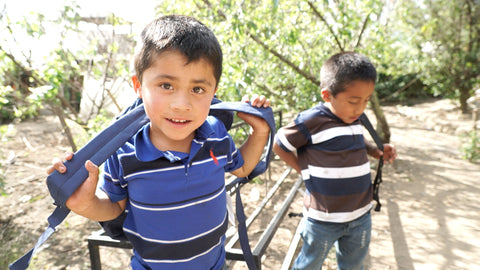Student Sponsorship
Changing Lives One Student At A Time
While all children in Guatemala are required to attend school for at least 6 years, many students in rural communities do not meet this requirement. Young boys tend to drop out of school around age 12, after completing the compulsory years of education to find work to help support their families. Young girls in this strongly patriarchal society tend to drop out or are not allowed to continue school in order to help care for their families.
Sponsorship helps keep students in school beyond the 6 years. More than half of sponsored students stay in school through high school, and many continue with University programs. In 2024, our program will be sponsoring our first college student seeking a Masters degree!
Students Who Need Sponsors
Donate

Benefits of Sponsorship
Your sponsorship helps pay for:
- Annual school enrollment fees
- Monthly school fees
- Middle School, High School, or University tuition
- Backpack with school supplies (elementary and middle school only)
- Uniform costs
- Bag of food (feeds a student and their family for 2-3 weeks)
- Bible
- Transportation to school
Join us today in providing opportunities for a better life through education.
- Pre-K-12 student - $336 annually (or $28 per month)
- University Student - $1,000 annually (or $83.33 per month)
- B2E Scholarship Fund – your choice
The B2E Scholarship Fund is a great option if you want to support the education of children, but are unable or do not want the commitment of sponsoring a specific student. B2E funds are used to provide scholarships for students who do not have a sponsor iand whose families demonstrate the greatest financial need.
Go to our donation page to set up monthly or annual recurring donations to sponsor a student or donate to our B2E Scholarship Fund.
We kindly ask that you choose to cover fees on your donation. This ensures that the entire amount of your donation is used to support our students.
FAQ
How does the program work?
After beginning a sponsorship, money will be distributed to cover the cost of items listed above. Education and More receives grade cards for each student enrolled in the program to verify that they are attending school and to better communicate with students and their families about their educational progress. You will receive updates on your student’s progress at least annually.
Can I send gifts or letters to the student(s) I sponsor?
Yes! If you wish to give the student a gift for holidays or a birthday, it is preferrable to send a check to our office at least 2 months before the date and state if you have a preference on what you would like purchased. The gift will be purchased in Guatemala to support their local economy and given to the student. It is preferred to send money, as it is costly to transport or ship items to Guatemala. Please do not send gifts to our office without contacting us first.
Can I correspond with the student(s) I sponsor?
Yes! You can send letters and greeting cards to our offices for your student. Please be sure to include their full name. Send any letters or cards to our offices at least 2 months before you intend for it to be delivered to allow time for translation. It will be hand-delivered to your student during the next mission trip.
What should I write about to my student?
Avoid writing about your material possessions or including photos that show wealth. Do not give your address or suggest the student should visit you in your country. Do not ask if they need or want anything from you. Instead, you can ask your student about themselves and find things that you have in common. Many students enjoy sports, reading, playing games with their friends, and helping their families. These are all good topics that can be a starting point for a conversation.
How are students selected and accepted into the program?
Our Program Coordinators live in Guatemala and work within each community regularly. They accept applications based on a set of criteria determined by the Board of Directors of Education and More such as: inability to afford school fees or supplies, parental commitment to education, and malnutrition in the family. Boys and girls of all ages will be accepted.